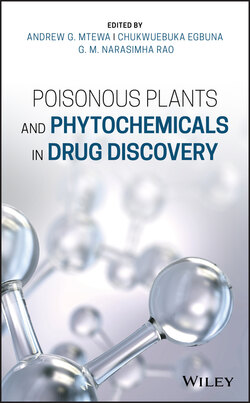Читать книгу Poisonous Plants and Phytochemicals in Drug Discovery - Группа авторов - Страница 26
1.10 Poisonous Plants as Carcinogens and Teratogens
ОглавлениеSome plant species contain teratogenic substances, which can cause deformities or abnormalities in the developing fetus in animals when ingested by the mother. However, no species have been shown to be specifically responsible for malformations in humans. The teratogenicity of plants has been demonstrated when they are ingested by some animals as part of their fodder. Teratogens usually act early in the gestation period of an animal, making it hard to pinpoint the exact causative agent when the malformations manifest [80]. Some plant species and their respective or suspected teratogenic compounds have been demonstrated in laboratory animals at large doses not normally consumed by humans. These include alkaloids from Senecio spp., which are responsible for possible teratogenic effects in rats and in utero deaths of calves, and Nicotiana spp. and Lobelia spp., which are responsible for some skeletal deformations in pigs [21].
Some compounds have been shown to promote liver cancer in rats, although they occur naturally in very low concentrations, which are typically far below the toxic concentrations in products consumed by humans. Such carcinogenic compounds include alkenylbenzene and its derivatives, which are found in products such oils from Sassafras, star anise, and nutmeg [21].
Other carcinogens or co‐carcinogens are the betel quid and tigliane and daphnane derivatives and related diterpenes. Bracken (Pteridium aquilinum) is also carcinogenic and has been implicated in bovine poisoning. Aristolochic acid from Aristolochia spp. is both nephrotoxic and carcinogenic and has thus been banned in many countries.
